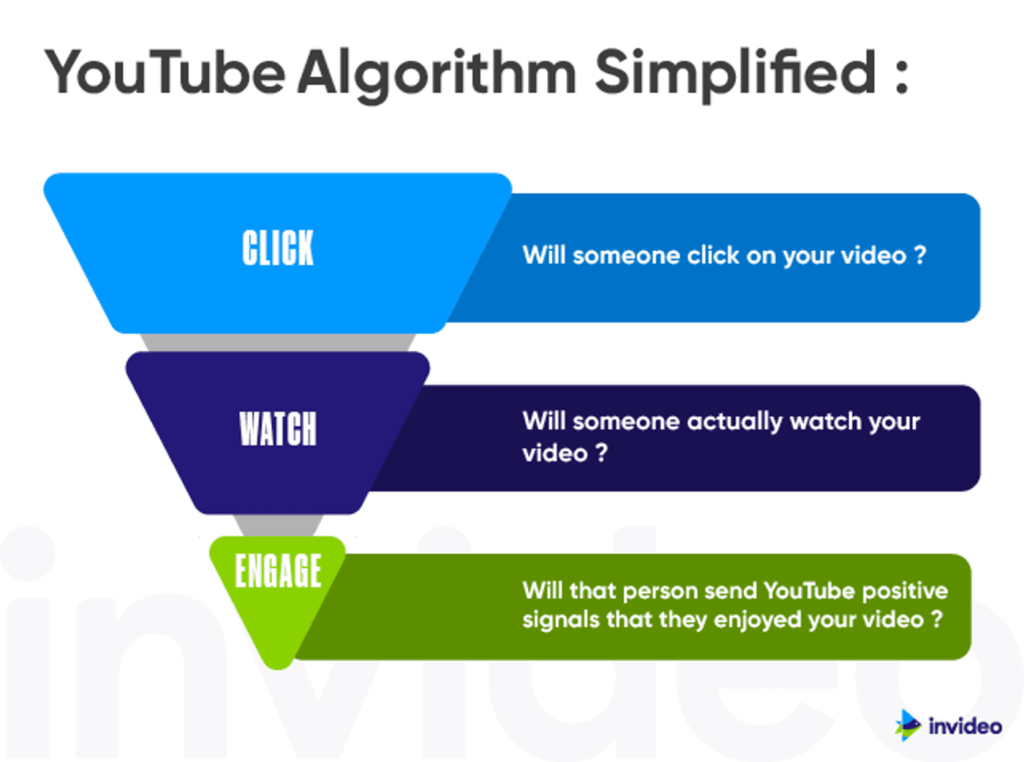The YouTube algorithm refers to the complex set of mathematical equations. And rules that YouTube uses to determine what content to recommend to users. YouTube’s algorithm tailors video recommendations and search results to each individual user’s preferences and behaviors. With the goal of keeping users engaged and spending more time on the platform.

The YouTube algorithm takes into account various factors to make these recommendations, including:
- Watch History: It considers the videos you’ve previously watched and liked, as well as the topics you’ve shown interest in.
- User Engagement: The algorithm tracks your interactions with videos, such as likes, comments, shares, and subscribes. Higher engagement indicates a stronger interest in the content.
- Video Information: Metadata like video title, description, tags, and closed captions provide context for the algorithm to understand the content.
- Viewer Behavior: YouTube looks at what other users with similar interests are watching and engaging with to make recommendations.
- Video Popularity: YouTube recommends videos that are trending, getting a lot of views, and engagement.
- Watch Time: The amount of time you spend watching videos. Especially consecutive videos from start to finish, is a significant factor. YouTube aims to suggest content that will keep you watching.
- Device and Location: Your device type and geographic location can also influence the recommendations you receive.
- Session Time: YouTube aims to suggest videos that will extend your viewing session. So it considers how likely you are to watch multiple videos in a row.
The algorithm is constantly evolving as YouTube updates and refines it to improve user experience and meet their business goals. Creators often try to understand and adapt to the algorithm’s behavior to optimize their videos for better visibility and reach. YouTube closely guards its exact algorithmic processes and weights for different factors. And the company periodically makes changes to combat clickbait, misinformation, and other undesirable content.
It’s important to note that while the algorithm is a significant driver of content recommendations. User behavior and personal preferences also play a role in shaping what videos you see on YouTube.
The YouTube algorithm is a complex system that uses machine learning to recommend videos to users.
It takes into account a variety of factors, including:
- Relevance: The algorithm first tries to match videos to users’ interests based on their watch history, search history, and other factors. YouTube analyzes the title, tags, description, and content of the video to determine its relevance to users. For example, if a user has watched a lot of videos about cooking, the algorithm will be more likely to recommend other cooking videos to that user.
- Engagement: The algorithm also looks at how users interact with videos, such as how long they watch, how many times they like or comment, and whether they share the video. YouTube recommends videos that are watched for longer periods of time and receive a lot of likes and comments. This is because the algorithm assumes that users are more likely to enjoy videos that they interact with.
- Quality: The algorithm takes into account the quality of the video, such as the production value, the content, and the creator’s reputation. YouTube recommends well-produced and informative videos more than poorly made or inaccurate ones.
The YouTube algorithm is constantly being updated to improve its accuracy and effectiveness. As a result, it can be difficult to predict exactly how a video will perform. However, there are some things that content creators can do to improve their chances of getting their videos recommended by the algorithm.
These include:
- Creating high-quality videos that are relevant to their target audience.
- Promoting their videos on social media and other platforms.
- Encouraging users to interact with their videos by liking, commenting, and sharing.
- Uploading videos on a regular basis.
- Optimizing their videos’ metadata, such as the title, tags, and description.
These tips helps content creators can increase their chances of getting their videos seen by more people and growing their YouTube channel.
Here are some additional tips for improving your YouTube algorithm:
- Use relevant keywords in your video titles, tags, and descriptions. This will help YouTube to match your videos to users’ search queries.
- Create eye-catching thumbnails for your videos. This will help to increase click-through rates.
- Make sure your videos are well-edited and have good audio quality. This will improve the overall viewing experience for your viewers.
- End your videos with a call to action, such as asking viewers to subscribe to your channel or like your video. This will help to encourage viewers to engage with your content.
- Be patient and consistent with your efforts. It takes time to build a successful YouTube channel. Don’t expect to see overnight results.

